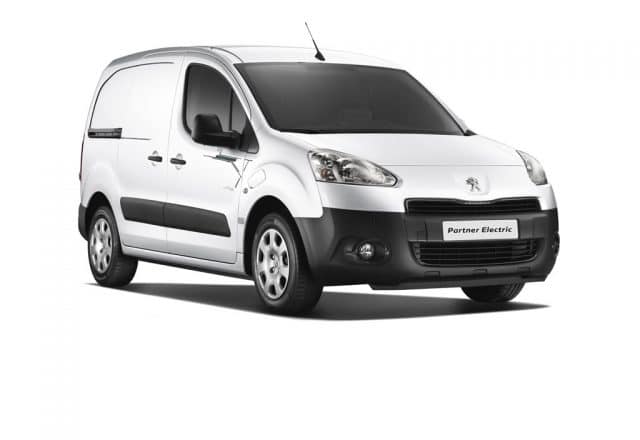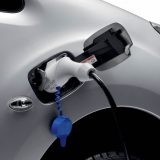Pros:
- Quick battery charging
- Very low running costs
Cons:
- Old design
- Restricted range
Switch on the Peugeot Partner Electric van
With the growing popularity of electric vans, the Peugeot Partner Electric delivers what potential owners are looking for. The weight of the batteries mean that the payload is reduced to 636 kg in the L1 and 552 kg for the L2 whereas the diesel model will carry a payload of 860kg; that could be a make or break difference for many potential buyers. It helps too that there is a Plug in Van Grant (PiVG) available which should cover 20% of the Partner Electric’s cost, including VAT.
However, it’s still a practical van and there’s plenty of space with three seats in the cabin since there is no gearbox intruding. The seats are supportive and firm and it’s a good van to drive around town. There’s also a bonus for driving around London and not having to pay the congestion charge and some councils in the capital also offer discounts on electric vehicle parking permits.
This 100% electric version of one of the best-selling small vans in the UK delivers a quiet driving experience. It’s modern and attractive with one of the segment’s best load volumes.
The van is aimed at those business users who want to reduce their fuel expenses and boost their environmental footprint; Peugeot say it will attract those customers who buy small vans but 70% of them will be making a daily journey of less than 60 miles.
To help shift sales, there is a three year or 60,000 mile vehicle manufacturer’s warranty which also covers the battery. There’s also a five-year or 40,000 miles drive train and battery manufacturer warranty as well.
Reasons to buy
The running costs for the Peugeot Partner Electric are exceptional and there are pluses for having zero emissions from the tailpipe. It’s a good enough workhorse for everyday use and the batteries can be recharged in just 30 minutes to 80% of capacity with a rapid charger, otherwise it’s a 10 hour wait. For buyers in London there are obvious savings to be had with no congestion charge and the possibility of free parking permits – the electric motor also makes town driving a joy since all of the power is available from setting off.
If you like the Peugeot Partner Electric then have a look at the Nissan e-NV200 and the Renault Kangoo ZE.
Running Costs
With claimed running costs of just 2p per mile, the Peugeot Partner Electric offers cheap and reliable motoring for those who are driving around town. For those with solar panels then running costs for recharging will be even lower. Peugeot says its electric van has a range of 106 miles from the high-capacity lithium ion batteries. However, the range is around 90 miles in real-world conditions which means some drivers may develop ‘range anxiety’ – this is the troubling scenario of running out of power miles away from home or a charging point. The electric motor produces 49kW, or 67 HP, with maximum torque of 200Nm. The van also utilises regenerative braking to help reduce brake wear and recharge the batteries.
Load Space
The standard Peugeot Partner offers 860 kg of load space but because of the battery’s weight this will fall to 636 kg for the L1 and 552 kg in the L2 version. As mentioned, there are two load lengths available with the L2 model making an appearance in early 2017 and having a load length of 250 mm longer than the L1. The 2,050 mm load volume extends to 3.7 m³ in the L2; fold the passenger seats flat and the L1 will see its load length extended to 3,250mm and the volume increasing to 4.1 m³. Access is easy thanks to the side loading doors and there’s a durable plastic cover for the load bed.
Technology & Safety
There’s not much in the way of standard equipment, for instance there’s no DAB radio or Bluetooth. Also, Peugeot responded to customer feedback and now all Partner Electric models have a Type 2 charging cable which is compatible with most public access charging points. It helps too that there’s a workplace grant available for those firms wanting to install charge points. Features for the Peugeot Partner Electric include ABS, air control and a windscreen that reflects glare. There’s also one touch electric windows and mirrors and remote central door locking. For those that need it, this small van also has electronic stability control and hill start assist.
Performance
From a standard plug, the Peugeot Partner Electric can be recharged in around 10 hours but there is a rapid charger available that will deliver 80% battery charge from 0% in 30 minutes. Around town, the Partner handles like its diesel counterpart with smooth handling and reasonable levels of performance; the silent cabin is something to be enjoyed. The Partner Electric has a top speed of 68mph – though it is a punchy performer around town. Drivers will also find that there is little in the way of body roll, and with a battery stored beneath the load floor means there’s a low centre of gravity so corners can be taken at speed and with confidence. The turning circle is also impressive and the overall city performance means it’s a sound choice for driving around town, particularly at speeds below 30 mph when progress can be swift.





